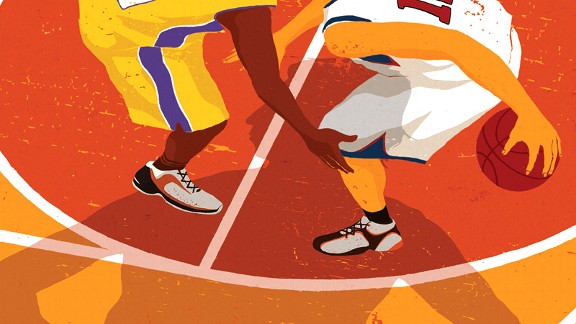There's a steep price to pay for weak guard play in the NBA title hunt, and that's money in the bank for Steve Nash
Updated: May 30, 2012, 8:10 AM ET
By Howard Bryant | ESPN The Magazine Mark SmithNash is 38, but his passing remains sharp, and he ranked first in assist percentage this season.
Mark SmithNash is 38, but his passing remains sharp, and he ranked first in assist percentage this season.
This story appears in the June 11 Women in Sports issue of ESPN The Magazine. Subscribe today!
THE NBA PLAYOFFS offered the standard narratives of whether LeBron James stood to gain or lose the most by finally winning or spectacularly losing another NBA championship, whether Kobe Bryant would seal a sixth ring (denied) and whether a fifth title would finally make the world wake up and pay attention to the wonder that is Tim Duncan.
Compelling storylines all, but here's the bigger picture: None of the players above is as important to this postseason as one whose team didn't even make the playoffs.
That player is Steve Nash. The eight-time All-Star will be an unrestricted free agent this summer, and he says he'll sign with a team that has a legitimate shot at the title. He won't lack for suitors. NBA orthodoxy says there is nothing more valuable than a big man, but today, especially in the postseason, where possessions are everything, point guards have never been more valuable. And each time James stood in the corner without touching the ball, or the talented but undisciplined Hawks took a shot in the fourth quarter better attempted in the first, or 76ers guard Lou Williams heaved a three as a first option in a one-possession game, Nash grew in value.
“
Moreover, teams know this is a player who's hungry to win, someone who doesn't want to end his career the way, say, John Stockton did, without a ring on his finger.
â€
Yes, it's true that only four true points (Bob Cousy, Magic Johnson, Nash and Derrick Rose) have won the MVP -- but Nash and Rose have won it three times in the past eight years. Watching the Thunder's playoff run this season, it's not hard to imagine Russell Westbrook someday becoming No. 5. This is the golden age of point guards, and the price for not having a distributor is heavy. James, the best player in the game, works twice as hard for his points because he must create his half-court offense. In the Eastern Conference semifinals, the Sixers could have won three of the first four games against the Celtics but for a field leader. The Hawks might have eliminated the Celtics in the first round had someone (anyone?) been able to run a half-court offense as the altitude of the moment grew thin; instead of beating Boston with execution, they played chuck-and-pray with Josh Smith. And as the Lakers discovered, Ramon Sessions isn't going to cut it the way Derek Fisher used to.
Then there are the Knicks. Amar'e Stoudemire, who is campaigning for his team to sign his former Suns teammate, was never as good a player as when Nash was his point guard. And for all the grief Carmelo Anthony receives, he hasn't enjoyed the company of a top-shelf pass-first, shoot-second guard since his early days alongside Andre Miller. (Chauncey Billups, Allen Iverson, Jeremy Lin and Baron Davis were all scoring points.) Perhaps Stoudemire and Anthony actually could coexist if they played with a lead guard who played to their strengths. Bringing out the best in his teammates is what Nash does best. For example, his primary pick-and-roll partners in Phoenix, Stoudemire and Marcin Gortat, ranked first or second in the NBA in points per game on pick-and-roll possessions. Stoudemire ranked just 18th in that category this season.
But it's not just the teams done in by their point guards that have boosted Nash's bottom line. The Celtics and Spurs have shown the value of having guards -- Rajon Rondo and Tony Parker -- with a pass-first mentality (though Parker is a highly accomplished scorer), guards who produce easy baskets for teammates not only in transition but in the half-court offense by finding mismatches and controlling tempo. That's what Nash excels at too. Of course, unlike Rondo, he has something -- a legitimate jump shot from midrange and three -- that prevents teams from leaving him open on defensive rotations.
Nash is 38; he isn't the Nash from his two-time MVP days, and teams will have to ask themselves whether he has three years left. Still, his passing remains sharp, as evidenced by the fact that he ranked first in the NBA in assist percentage this season (53.1 percent), tying his career high in that category, set just the previous year. Moreover, teams know this is a player who's hungry to win, someone who doesn't want to end his career the way, say, John Stockton did, without a ring on his finger. (Nash has never even been to the Finals.) So this summer, he'll get to call his shot -- he can sit back and watch film of teams that failed in the clutch before making his choice.
Where does he even begin?
Follow The Mag on Twitter (@ESPNmag) and like us on Facebook.

No comments:
Post a Comment